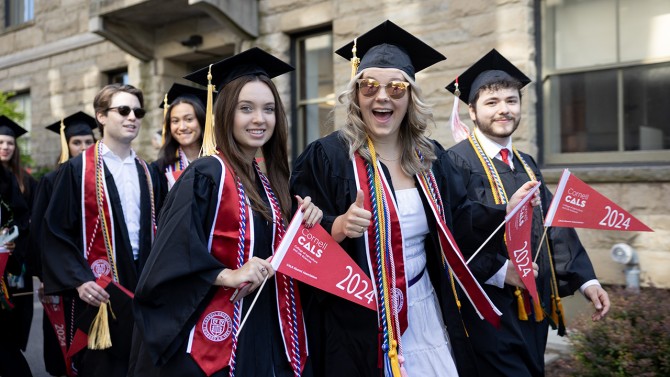
President Martha E. Pollack gave her final Commencement address to the Class of 2024.
Pollack to grads: Live a value-driven life
By David Nutt, Cornell Chronicle
President Martha E. Pollack gave her final Commencement speech – and a little advice – to the Class of 2024 and their guests in Schoellkopf Field on May 25.
She began her remarks with one last assignment for Cornell’s 156th graduating class, which comprises more than 8,000 students, including undergraduate and graduate students: to stand up, reflect upon the people who helped them along on their way to graduation and, with gratitude and at the count of three, to shout “thank you.”
Over her time as president, Pollack said, she has delivered 15 Commencement speeches, advising students to read, to be kind and to choose courage over comfort. She said she’s never sure what anyone remembers, unlike her experience at New Student Convocation in 2019, when she urged new students to open themselves to new experiences by taking off their headphones.
“I know that one sank in to at least some of them, because for years after that I’d pass students on campus who would see me, point at their ears, and say, ‘Look President Pollack, no headphones!’” she said.
As the students processed into Schoellkopf Field, their families lined Campus Road, snapping pictures of the graduates with their arms full of flowers. Inside the stadium, thousands of graduating students took selfies and cheered under blue skies. The Cornell University Chorus and Glee Club treated the crowd to soaring performances.
During her speech, Pollack recalled her first Cornell commencement address, in the spring of 2017, when she quoted from career diplomat and alumnus Daniel Fried ’74, who wrote, “I learned never to underestimate the possibility of change, that values have power, and that time and patience can pay off, especially if you are serious about your objectives.”
“I urged the graduates of the Class of 2017 to begin their careers by clarifying their values,” Pollack said. “Clarifying our values is something that we, the Cornell community, did together, through a process that took place just before most of you arrived in Ithaca – discerning together, across our students, faculty, staff and alumni, what defined the Cornell ethos, and what it meant to be a Cornellian.”
She listed the six core values that resulted from that process: purposeful discovery; free and open inquiry and expression; a community of belonging; exploration across boundaries; changing lives through public engagement; and respect for the natural environment.
That statement of values, she said, has been critically important in helping her navigate the university’s course through intense and complex issues, from a global pandemic to a national reckoning on race to a divisive political culture and the impacts of an ongoing war.
“Clear values are a north star, in life and in leadership: casting light on complex situations, and guiding your decisions when the way forward is anything but obvious,” Pollack said. “But just as a clear set of values will help you to navigate your lives, you’ll also, throughout your lives, need to navigate your values. Because deeply felt values can come into tension with each other – and indeed, in any full and richly lived life, they will.”
People have two options when that happens, she said: They can either let one value give way to another, or they can do “the hard work of managing that tension: seeking a balance that honors both values to the fullest extent possible.”
Everyday life is full of such balance-seeking, from deciding between going to the gym or spending time with family, to being concerned about carbon emissions but also needing to travel for work.
“In every case, your values will help you decide what to do – but in the end, the one who has to make the decision, who has to choose how to balance your values, is you,” she said. “Because human lives and choices are inherently complex.”
Institutions and organizations must navigate those same types of tensions between values – but on a far larger scale. In recent years, and especially over the past seven months, Pollack said, two of the university’s core values – free and open inquiry and expression, and being a community of belonging – have come into tension.
“Part of our responsibility, as a university, is demonstrating how to hold these two values together, even when they are in tension: finding ways to honor both, even when we cannot do so absolutely; deploying all the tools available to us as scholars to find the compromises and the solutions that are, while imperfect, the best available,” she said.
Holding those two values together was central to the founding vision of Ezra Cornell and Andrew Dickson White, Pollack said, despite the fact that their ideas were considered deeply radical at the time.
“It was precisely that dual commitment to any person and any study – to not only tolerating but valuing diversity, in individuals and in ideas – that made our university, and the model it set, possible: a model on which the major research university, as we know it today, is based,” she said.
Pollack called the current moment a critical one for universities, which need to push back against “gale-force political winds” with clarity, resolve, intellectual humility and “an openness to always improving to meet the moment.”
“Higher education – with its culture that demands evidence and reasoned argument, and a commitment to truth – is a bulwark against the threats of authoritarianism faced by our nation and the world,” she said, to loud applause. “And it is critical that we continue to educate students in ways that enable them to foster our free and democratic way of life, and to advance our society.”
The full speech can be read here. A livestream of the first ceremony can be viewed here; the second ceremony can be viewed here.
Media Contact
Get Cornell news delivered right to your inbox.
Subscribe




